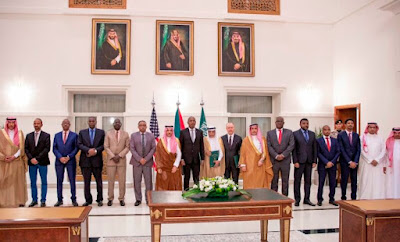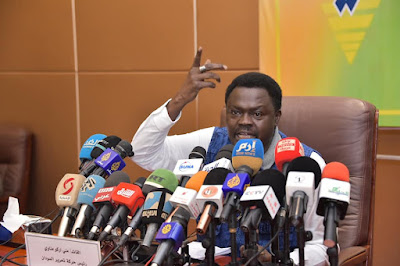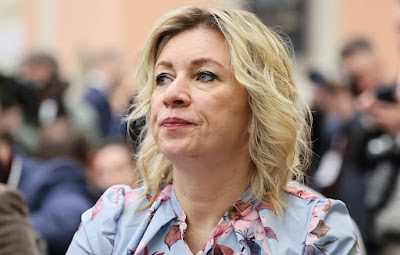Impunity Enabled Generals to Recklessly Destroy Sudan
by Hala al-Karib
Regional Director, Strategic Initiative for Women in the Horn of Africa (SIHA)
I haven’t looked at my face in the mirror since the morning of 15 April when Sudan got turned upside down by two generals battling for power, the culmination of decades of state failure, impunity, and the negligence of the international community.
I don’t know what I look like now. I don’t want to see myself. I don’t want to cry.
That Saturday morning was the turning point. Before then, life was about that next medical appointment, school exam, or job interview: the upcoming wedding, or baby’s naming ceremony, or funeral to attend; the savings plan, the friend to visit, the house or small room to build; the tuk tuk, motorbike, or car to buy.
But all that has vanished.
We woke up that Saturday to a new reality of killings, of bodies strewn on the streets, of artillery bombardment and burning buildings. We are now in a desperate period of fear, trauma, and – for those who can – exodus.
Khartoum is the capital of 45 million Sudanese. It’s also the home of at least 10 million of us – including more than two million refugees who came here for sanctuary. For Khartoum to be destroyed like this, by thugs and monsters, is shocking, and perplexing.
That Saturday it took me the whole day, scanning the news channels and communicating with friends and colleagues before my brain was able to recognise what was actually happening.
We had fallen into the hands of those with no mercy, without humanity.
The city was being torn apart by rival militaries: Those loyal to General Abdel Fattah al-Burhan, the armed forces chief, versus his deputy, Mohamed Hamdan Dagalo, the head of the paramilitary Rapid Support Forces (RSF).
It is behaviour that the people of Darfur have witnessed for years – where the RSF and other militias have protected their power by subjecting the people to intimidation and oppression, and where al-Burhan and the Sudanese army have also been accused of coordinating attacks against civilians.
The collapse
I came to Khartoum in early April to see my mother, and to check on an unwell brother and visually impaired aunt. I wanted to give my siblings – who had been looking after them – a break.
I planned to work out of the Khartoum office of my organisation, the Strategic Initiative for Women in the Horn of Africa (SIHA), an African feminist women’s rights network.
I had so much to do. I was planning a trip to Blue Nile and North Darfur to launch one of our new projects. We were pushing on with our work, almost oblivious to the abnormalities all around us.
As Sudanese, we were witnessing the collapse of the country, its decay, following the military’s seizure of power in October 2021 – bitterly protested by street-based pro-democracy groups.
There was the economic pain of an ever-accelerating cost of living, which means most people dependent on a daily income cannot afford the basics. Even the salaries of teachers, nurses, doctors, and government public servants have only been paid a few times since the coup – stranding them for months without an income.
The international community saw the way out of the crisis as a power-sharing deal between civilian politicians and the military.
The intention was to repeat the coalition formula agreed upon after the collapse of the Omar al-Bashir regime in 2019, an arrangement the military subsequently tore up two years later.
The UN, the African Union, and the regional Intergovernmental Authority on Development (IGAD) were supposed to coordinate the political process leading to a new coalition government – but it was naïvely and ineptly managed.
Fundamentally, power-sharing doesn’t solve Sudan’s deep-rooted structural problems, when seats at the political table are reserved for the men in uniform responsible for the violence and injustice we’ve long been forced to live with.
Power-sharing covers up war crimes and crimes against humanity. It entrenches the military elite based on the assumption that – for the sake of peace – they can’t be touched. The result is the weakening of human rights and justice frameworks, and the legitimisation of the warlords, who are rewarded with access to resources and positions.
The 2020 Juba power-sharing agreement that followed the fall of al-Bashir was supposed to lead to free and fair elections. Instead, the generals have since been competing among themselves, mobilising their forces to achieve their corrupt ends.
That is the root of the violence we are confronted with today on the streets of Khartoum and just as bloodily in Darfur and Kordofan – as the army and the RSF battle it out for supremacy.
Civilian politicians have also played a role. Sudanese people have been exhausted by the divisions and lack of leadership among the parties. As a result, politicians lost their connection to the people and failed to cultivate popular support.
Solidarity and courage
Even on the eve of the collapse, Sudanese were still trying to manage life as best as possible. I drove to a relative’s funeral around the Reyad area on Friday night and could still see people taking their kids out to purchase their Eid clothes for the end of Ramadan.
The main roads were dark, and street lights and traffic lights hardly working.
I remember thinking Khartoum reflected the impoverished soul of Sudan’s military clique. After seizing power, they had no idea how to run the country beyond plundering, and killing and violating its citizens.
That weekend, we had 14 guests staying with us: two project auditors from SIHA’s Uganda office, two Ugandan consultants, and 10 colleagues from Darfur taking part in a training programme.
On Saturday 16 April, three of our guests were at the airport, checked in and preparing to board their flight home, when the RSF began shelling. No one was allowed in or out of the airport for hours.
As we tried to figure out what to do, one by one their phone batteries died. They had to use the phones of other passengers, who pleaded for us to take them too if we came to collect our colleagues.
Then, in the afternoon, the RSF began ordering everyone to leave the airport, and hundreds of passengers were ushered out onto the main road.
I cannot be grateful enough to Adla from our Khartoum office, and her husband. They jumped into their old car and drove through the back streets to the airport. They picked up, thank God, our friends and managed to find lodgings for them.
When the hotel they stayed in ran out of food and water, Neimat – another SIHA colleague – and her husband managed to keep them fed. After four days, we were finally able to evacuate them home to Uganda via South Sudan.
Meanwhile, our friends from Darfur were struck at a hotel on Africa Road. It was among the first targeted by the RSF, who broke in and took the safe and then robbed the residents of their money and phones.
Coming from Darfur, our colleagues understand how the RSF operates – what triggers them, and how to negotiate. It took days, but they finally managed to leave the hotel on foot, although without their belongings.
When we spoke later, they told me how the RSF soldiers had made daily demands for money, terrifying the hotel guests by firing into the air.
It was the same story at the Acropole Hotel, where the last of our consultants from Uganda was staying. There was no power and water for the first three days, while the RSF ransacked every corner of the landmark hotel, again robbing guests and workers at will.
After days of being held, the hotel’s guests were dropped off at the grand mosque in the middle of Khartoum. Our colleague told a horrific story of picking his way through the dead bodies scattered on the streets.
Finally, he reached Omdurman, where he was picked up by Mayada, a SIHA staff member, and her husband. He stayed for two nights with Mayada before she managed to put him on a truck to South Sudan.
The courage, thoughtfulness, and endurance of our guests contributed to their safety in a situation where we couldn’t do much for them if it all had gone wrong.
Staying behind
SIHA has 32 staff in Sudan, the majority of us are scattered throughout rural Sudan, but many of us are also in Khartoum. Sudan is our home, and we are committed to staying, to care for our loved ones – we cannot abandon them.
So when the shelling and shooting started, I barricaded my family inside our house. The main gate was blocked with cars and piles of bricks. We closed up the windows and doors. Our bright open home became like a cave.
I was, however, obsessed with making sure that my girls – my daughter and two nieces – got out. Over the next few days, I sat with my sister and we thrashed out a plan. The girls are now safe outside the country.
As I write this article, three weeks after the violence began, I’m sitting beside my mother and aunt, somewhere safe and quiet near Khartoum.
My brother has just come in and said I look tired. Yes, I am. All I want to do is sleep and find space to think.
Looking at what has happened to my country, I can tell you that this violence is not random or a reaction to political tension. I believe this is a well-planned and well-funded vile act in support of the RSF.
The question is, how come all those high-powered bodies that were supposed to be coordinating the political process – the UN, the regional groupings, the international financial institutions, the donor governments – utterly failed to see it coming? What a shame!
In the meantime, I still don’t dare to look at myself in the mirror, and I don’t want to cry.
























